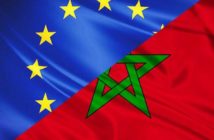Euractive
By James Moran
Morocco’s foreign minister Nasser Bourita with EU High Representative Federica Mogherini.
EU/Morocco relations have enjoyed a resurgence after a period in the doldrums. Now they can move forward towards an ambitious partnership, writes James Moran.
James Moran is Associate Senior Research Fellow at the Centre for European Policy Studies and former EU Ambassador to Egypt & Jordan
After a period in the doldrums, it has been a good year so far for EU-Morocco relations. Early in 2019, the European parliament approved amendments to the EU-Morocco Association and fisheries agreements that resolved the dispute over the inclusion of Western Sahara in the scope of those accords.
This helped to pave the way to the joint declaration at the successful Association Council in June which sets out a number of ambitious goals on joint security, migration management, climate, trade and development, and many other areas. As the EU’s outgoing High Representative Federica Mogherini said at the time, ‘we have now turned the page’.
Shared interests
The change in tone and substance reflects a strategic reappraisal by both sides of their core interests. With Tunisia and Algeria in political transition, Libya mired in internal conflict, and persistent insurgencies in the Sahel, Morocco is for the EU a rare example of political stability in its turbulent southern neighbourhood and has proved to be a reliable and effective partner in control of terrorism and migration. On the latter, in 2018/19, some 135,000 irregular migrants were prevented from reaching Europe via maritime routes off the Moroccan coast, 38,000 were rescued at sea and over 300 people smuggling networks were disbanded.
With conflict and instability dogging the North African region, and by extension Europe itself, the EU has a strong interest in supporting a peaceful solution to the Western Sahara dispute, and in the joint declaration welcomed the ‘serious and credible’ efforts led by Morocco to that end, under the auspices of the UN.
European commercial interests are also strong in Morocco, with large stocks of European investment, notably in the Auto industry. In the bigger picture, since rejoining the African Union, Rabat is one the EU’s more important partners in taking forward its Africa strategy, which has been identified by the current Finnish EU Presidency as a major priority.
For Morocco, the EU remains by far its most important economic partner, accounting for well over half of its trade and investment, and it has very significant links to Europe through the sizeable Moroccan-origin communities in Spain, France and elsewhere, which generate major remittances, and tourism. It shares interests in controlling illegal migration and terrorism, both of which can threaten its own stability, and fighting climate change. It also needs European understanding and support in dealing with the Western Sahara.
Human rights and democracy remain bones of contention, although relative to many other countries in the middle east and north Africa, Morocco has had some success in fostering political inclusion and government accountability, areas where King Mohammed VI has shown strong leadership.
Time for delivery
So, the stage is now set for a step change in relations and it is likely that the new EU leadership, once confirmed, will quickly understand the potential for greater cooperation.
Indeed, Ms Mogherini’s designated successor as High Representative, Josep Borrell is a frequent visitor to Morocco and as Spanish Foreign Minister, he has been vocal in calling for better relations and greater EU support for the country. One of his first tasks will be to review the EU’s southern neighbourhood policy, in which Morocco is a key participant, and given his record one would expect that he will give a high priority to delivering on the joint declaration.
Three areas stand out for urgent attention:
A return to talks on a mobility partnership, where the key quid pro quo will as ever involve the EU facilitating legal migration for business people, students and young workers and the like in return for Morocco further intensifying cooperation on control of illegals, including on return and readmission.
In the past, this has proved difficult, not least because of Morocco’s reluctance, in common with the rest of the southern neighbourhood countries, to readmit third country nationals. If it is to work this time, the EU will doubtless have to provide greater incentives than those already available, such as financial support for development and trade preferences.
Both sides’ strong commitment to the Paris convention means that cooperation on climate change is an area where there could be low hanging fruit: Morocco is already a leader in its region in renewable energy (it is home to the world’s largest concentrated solar energy farm) and greater EU investment, using grant aid resources in combination with loans from its development banks should be a top priority.
Last but by no means least, both sides have committed to relaunch negotiations on a Deep and Comprehensive Free Trade Agreement (DCFTA). The talks have been stalled since 2014 and there is opposition within some sectors of the Moroccan economy that fear that opening up will jeopardise their businesses.
The EU needs to be flexible in its approach here, and a new offer will be needed if talks are to get underway again. But there is wide recognition that a DCFTA would provide a shot in the arm to EU Foreign Investment and the creation of jobs that go with it, a major challenge for Rabat as it struggles to deal with its ‘youth bulge’.
In all, there are high hopes on both sides of the Med that 2020 will provide proof of the pudding cooked last June. And when it comes to bets on where the EU can have the most positive impact in the south, Morocco is at, or near the top of the list.







